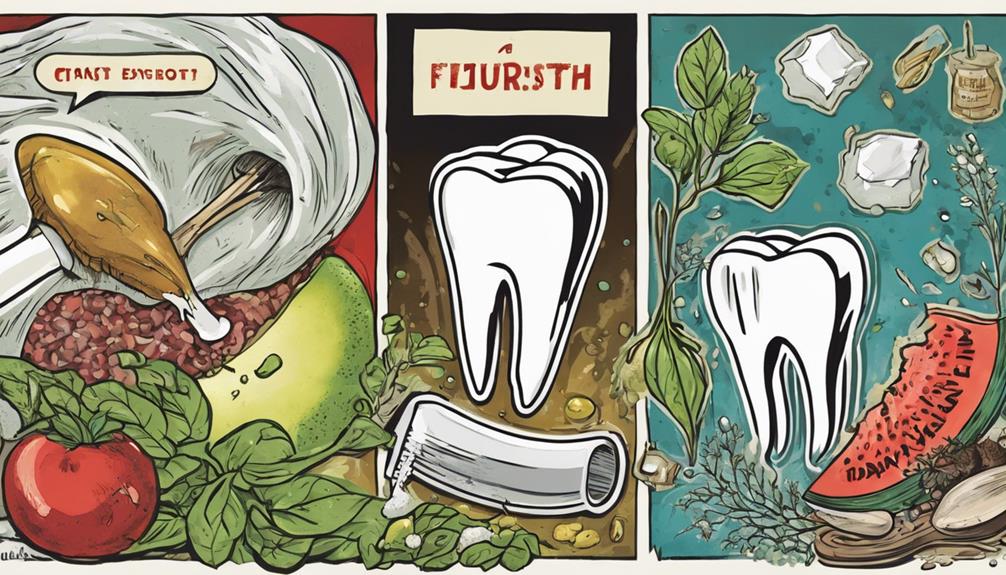Fluoride's a key player in protecting your teeth. It strengthens tooth enamel and greatly reduces the risk of cavities, especially in children. When you use fluoride toothpaste, it actively helps remineralize your teeth and creates a shield against decay. Some concerns about fluoride toxicity are largely unfounded, as extensive research shows it's safe at recommended levels. While there are myths about its effects, its benefits for maintaining dental health are well-documented. Curious about how fluoride can fit into your or your child's routine? There's more to explore about its role in dental care.
Key Takeaways
- Fluoride is a natural mineral that strengthens tooth enamel and reduces the risk of cavities by 20-40%, especially in children.
- Regular use of fluoride toothpaste and professional treatments provide ongoing protection against tooth decay and promote remineralization of enamel.
- Extensive research indicates that fluoride is safe at recommended levels, with no significant link to cancer or adverse health effects.
- Children should use fluoride toothpaste under supervision to prevent swallowing, with early introduction fostering strong enamel development.
What Is Fluoride?

Fluoride is a naturally occurring mineral that plays an essential role in strengthening your teeth and preventing cavities. Found in soil, water, and various foods, it's important for maintaining good dental health.
Fluoride works primarily by enhancing the remineralization of tooth enamel, which is significant for protecting your teeth from decay. When you consume fluoride, it helps to form a protective barrier on tooth surfaces, making them more resistant to acids produced by bacteria.
Many communities add fluoride to public water supplies at a regulated level of 0.7 mg/L. This practice aims to maximize dental health benefits for everyone, particularly children, who are most susceptible to cavities.
Studies endorsed by organizations like the WHO and CDC have shown that fluoride can reduce the incidence of dental caries by 20-40% in children.
You'll also find fluoride in various dental products, including toothpaste and mouth rinses, ensuring it's easily accessible for your daily oral care routine.
Benefits of Fluoride

Fluoride plays an essential role in strengthening your tooth enamel, making your teeth more resistant to decay.
It greatly reduces the risk of cavities, especially in children, by up to 40%.
Strengthening Tooth Enamel
Regular exposure to fluoride can greatly enhance your tooth enamel, making it more resistant to decay and helping restore lost minerals.
When you use fluoride, you're promoting remineralization, a process that strengthens your tooth enamel by replacing essential minerals your teeth may have lost over time. This is vital for maintaining good dental health, as stronger enamel can effectively fend off the harmful effects of bacteria and acids from your diet.
Fluoride forms a protective barrier on your tooth surfaces, which serves as a defense against acid attacks caused by dietary sugars and decay-causing bacteria. This barrier not only keeps your enamel strong but also aids in preventing the onset of cavities.
Studies suggest that both children and adults benefit from fluoride, as it helps maintain stronger enamel throughout life, leading to lower cavity rates.
Reducing Cavities Risk
Using fluoride can dramatically lower your risk of cavities, making it an essential part of your dental care routine.
Whether you're a child or an adult, incorporating fluoride into your oral health regimen helps protect your teeth in several ways:
- Reduces dental caries: Fluoride can decrease the incidence of cavities by 20-40% in children.
- Enhances remineralization: It helps restore lost minerals to early carious lesions, reversing signs of decay.
- Forms a protective barrier: Fluoride creates a shield on tooth surfaces against acids from bacteria and sugars.
- Community benefits: Areas with fluoridated water show notable reductions in cavities compared to those without it.
Incorporating fluoride into your dental routine not only strengthens your teeth but also promotes better oral health for you and your family.
It's a simple yet effective way to considerably reduce the risk of cavities and maintain a bright, healthy smile.
Myths About Fluoride

You might've heard some strong claims about fluoride that raise concerns, but many of these are just myths.
For instance, the idea that fluoride causes cancer or negatively impacts IQ has been debunked by extensive research.
It's important to separate fact from fiction to understand fluoride's true role in dental health.
Cancer Causation Myths
Many myths persist about fluoride causing cancer, despite extensive research disproving any causal link. You might find claims suggesting that fluoride poses a cancer risk, but the evidence doesn't support these assertions. Research from reputable organizations consistently highlights the safety of fluoride in preventing dental decay without increasing cancer risk.
Here are some key points to evaluate:
- The World Health Organization (WHO) and the CDC found no causal link between fluoride and cancer.
- The American Dental Association (ADA) endorses fluoride for its effectiveness in maintaining dental health.
- Research shows fluoride is safe at recommended levels, with toxicity occurring only at extremely high doses.
- Historical data fails to show a connection between fluoride exposure and cancer.
Understanding these facts can help you make informed decisions about fluoride use. By prioritizing safety and dental health, you can be confident in fluoride's role in public health without fear of cancer risks.
Toxicity Misconceptions
Contrary to popular belief, fluoride is safe when used at recommended levels, making it an essential ally in the fight against tooth decay.
Many people mistakenly think fluoride treatments pose a significant toxicity risk, but this isn't accurate. Extensive studies have confirmed that fluoride doesn't cause cancer or negatively affect cognitive development. In fact, it's proven to be safe in dental products like toothpaste and mouth rinses.
The toxicity associated with fluoride only arises at very high doses, which are far beyond what you encounter through everyday use. Many populations still struggle with high rates of tooth decay, highlighting that fluoridated water and products are important for effective dental health.
It's also a myth that only children benefit from fluoride treatments; adults can gain significant advantages as well. By strengthening enamel and preventing decay, fluoride plays a crucial role in maintaining your dental health throughout your life.
IQ Impact Concerns
Fluoride's role in dental health often comes under scrutiny, especially with concerns about its potential impact on cognitive development and IQ. However, you should know that the scientific evidence overwhelmingly supports fluoride's safety and effectiveness. The Centers for Disease Control and Prevention (CDC) and the American Dental Association both affirm that fluoride in the right amount is safe and beneficial for oral health. In fact, the CDC named water fluoridation as one of the top ten public health achievements of the 20th century. It’s important to educate parents and children about the truth about fluoride for kids, so they can make informed decisions about their dental health.
Here are some key points to evaluate:
- Studies from organizations like the WHO and CDC show no significant IQ impact from fluoride at recommended levels.
- Claims linking fluoride to decreased IQ often arise from flawed retrospective studies, which lack reliability.
- The American Dental Association (ADA) maintains that fluoride's benefits in preventing dental decay far outweigh any unverified risks to cognitive function.
- Research suggesting neurotoxic effects typically involves exposure levels much higher than those found in fluoridated water (0.7 mg/L).
Sources of Fluoride

You can find fluoride in several key sources, including fluoridated drinking water, dental products, and professional treatments. Fluoride in the water is a major contributor to good dental health, with communities generally maintaining a level of 0.7 mg/L for ideal benefits.
In addition to drinking water, fluoride is present in dental products like fluoride toothpaste, which helps strengthen enamel and prevent cavities. Foods and beverages prepared with fluoridated water also enhance your fluoride intake, making it even easier to maintain your dental health.
Here's a quick overview of fluoride sources:
| Source | Benefits |
|---|---|
| Fluoridated Drinking Water | Provides consistent fluoride exposure |
| Fluoride Toothpaste | Strengthens enamel and prevents cavities |
| Professional Treatments | Delivers concentrated fluoride for high-risk individuals |
If you live in a non-fluoridated area, consider fluoride supplements to guarantee you're getting the necessary amount of fluoride for maintaining oral health. By utilizing these sources, you can effectively support good dental health and reduce the risk of tooth decay.
Safety Regulations

Understanding the sources of fluoride is important, but equally essential are the safety regulations that govern its use to guarantee public health. These regulations ensure that fluoride levels in public water systems remain safe and effective.
The Environmental Protection Agency (EPA) sets the maximum allowable fluoride level at 4.0 mg/L, while the ideal level for dental health is around 0.7 mg/L. This balance helps minimize any potential health effects.
Here are some key points about safety regulations surrounding fluoride:
- Regulatory Oversight: EPA monitors fluoride levels in public water systems.
- Health Standards: The established limits aim to prevent adverse health effects.
- Monitoring Programs: Regular checks help maintain compliance with safety standards.
- Community Education: Public health campaigns raise awareness about fluoride benefits.
Fluoride Toothpaste Recommendations

Using fluoride toothpaste is vital for maintaining ideal dental health in both children and adults. The American Dental Association (ADA) recommends that you start using fluoride toothpaste as soon as your child's first tooth appears.
For children aged 3 and older, using fluoride toothpaste twice daily greatly reduces their risk of cavities. Just remember to use a pea-sized amount to minimize the chance of swallowing excessive fluoride.
Fluoride toothpaste works by strengthening the enamel, which helps to prevent cavities not just during brushing but even after, as fluoride continues to offer protection through saliva.
It's important for adults to use fluoride toothpaste as well, since it plays an important role in maintaining strong teeth and overall dental health throughout life.
Incorporating fluoride toothpaste into your daily routine is a simple yet effective way to protect both you and your children from decay. Make sure everyone brushes for two minutes, twice a day, to make certain they get the full benefits.
Following the ADA's recommendations will help you and your family achieve a healthier smile for years to come.
Fluoride for Children

Fluoride plays an essential role in strengthening children's teeth and preventing cavities when used correctly. As a parent, it's vital to understand how to use fluoride effectively to protect your child's teeth. Here are some key points to take into account:
- Supervise brushing: Monitor your child to prevent them from swallowing fluoride toothpaste.
- Appropriate age: Children aged 3 to 6 should use fluoride toothpaste based on their individual decay risk.
- Dental fluorosis awareness: Be cautious about excessive fluoride intake to reduce the risk of dental fluorosis, especially in children under 8.
- Cavity reduction: Studies show fluoride can lower the incidence of dental caries in children by 20-40%, leading to healthier teeth.
Professional Dental Treatments

While fluoride in children's toothpaste is important for early dental health, professional dental treatments take that protection a step further by offering concentrated fluoride applications that strengthen tooth enamel and prevent cavities. These treatments, like fluoride varnishes and gels, deliver powerful doses of fluoride directly to your teeth, providing an extra layer of defense against dental caries.
Routine fluoride treatments can greatly reduce the risk of cavities, particularly in children and others at higher risk. If you're living in a non-fluoridated area or have a history of frequent cavities, your dentist might recommend additional fluoride treatments tailored to your dental health.
Silver diamine fluoride (SDF) is another innovative option that dentists use to halt cavity progression, especially for patients who may struggle with traditional procedures.
Professional dental treatments are conducted in controlled environments, ensuring safety and effectiveness. This allows your dentist to monitor your response to the treatment and catch any potential side effects early.
Maintaining Dental Health

To maintain ideal dental health, you should brush your teeth twice daily with fluoride toothpaste and floss regularly to keep cavities at bay.
Brushing with fluoride helps strengthen your enamel, protecting against tooth decay caused by acidic foods. Flossing is equally important, as it removes plaque and debris from hard-to-reach areas, promoting healthy gums.
Here are some essential tips for effective dental care:
- Brush for at least two minutes, ensuring you cover all surfaces of your teeth.
- Use fluoride toothpaste to maximize cavity protection.
- Floss daily to prevent gum disease and maintain overall oral health.
- Limit sugary snacks to reduce the risk of tooth decay.
Frequently Asked Questions
Why Shouldn't You Use Fluoride?
You shouldn't use fluoride because emerging research suggests it may pose neurotoxic risks, especially to vulnerable populations. Studies link fluoride exposure to lower IQ and increased ADHD, raising concerns about its overall safety for health.
Why Are Some Dentists Against Fluoride?
Some dentists oppose fluoride due to potential neurotoxic effects, especially in children. They argue current limits are insufficient, advocate for individualized care, and support alternative preventive measures over broad fluoridation practices for population health.
Does Fluoride Treatment Damage Teeth?
“An ounce of prevention is worth a pound of cure.” Fluoride treatments don't damage teeth; they strengthen enamel and prevent decay. When used correctly, they're beneficial, keeping your smile bright and cavity-free.
Should I Say No to Fluoride at the Dentist?
If you're considering saying no to fluoride at the dentist, remember that it effectively prevents decay and strengthens enamel. Skipping it could increase your risk of cavities, especially if you're prone to dental issues.
How Does Fluoride in Toothpaste Counteract the Effects of Harmful Foods on Teeth?
Fluoride in toothpaste plays a crucial role in combating the damaging effects of the top 5 worst teeth foods. It helps to strengthen the enamel, making it more resistant to the acids and sugars found in these foods. This protection is essential for maintaining good oral health despite dietary challenges.
Conclusion
In the bustling aisles of your local store, you'll spot fluoride toothpaste shining brightly, just like the smiles it helps create.
As you weigh the benefits against the myths, remember that balance is key.
Fluoride's benefits for your teeth can be like a gentle tide, washing away decay while strengthening enamel.
So, as you brush and care for your smile, trust the science behind fluoride, ensuring your dental health stays as bright as your future.









